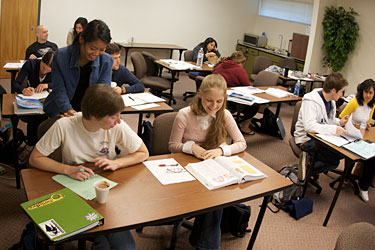Learn More About PUC
- Home
- About PUC
-
Academics
-
All Departments
- Aviation
- Biology
- Business Administration & Economics
- Chemistry
- Communication
- Education
- Emergency Services
- English
- Global Public Health
- History and Political Studies
- Honors
- Kinesiology and Health Science
- Mathematics
- Music
- Nursing & Emergency Management
- Paramedic
- Pre-Allied Health
- Pre-Professional Programs
- Psychology & Social Work
- Social Work
- Theology
- Visual Arts
- World Languages
- AS in Nursing with Adventist Health
- Faculty Directory
-
All Departments
- Admissions & Aid
- Alumni
- Athletics
-
Life at PUC
Students Create Podcasts in Biology and Nursing
By David Ranzolin on May 4, 2009

Teachers understand that the modern world has drastically rearranged students' reception and absorption of knowledge. Pacific Union College professors Shana Ruggenberg and Aimee Wyrick address the new mentality by implementing multi-media devices such as the podcast into class curriculum.
Ruggenberg's Introduction to Nursing and Wyrick's Introduction to Biology classes each require students to narrate a podcast presentation. Both feel the podcast engages students better than more mundane, lecture-type projects. "Having the students create podcasts taps into experiential learning - much of the literature on learning tells us that students learn much in the process of creating a product," says Ruggenberg. "In my class, this gives the students an opportunity to explore a topic, to present what they've learned in a succinct manner, using a narrative designed to capture interest, and also to learn a bit about maximizing both the audio and visual channels of the brain for learning."
Ruggenberg and Wyrick understand that the application of multi-media devices seems to leave an indelible impression on students. They feel students "own" the material to a much greater extent, as the podcast requires each student to synthesize information not covered in class in a visually appealing fashion. "The digital podcast makes a student's project more 'techno' and thus, engaging for my students," says Wyrick. "It was my opinion that former projects didn't engage all students and lacked the 'wow' factor."
Sophomore nursing major Grace Jung agrees. "The podcast coupled scientific research and data collection with a creative and artistic twist which made the project more interesting," she says. "It was more engaging and mentally stimulating than writing a regular paper." Podcast topics range from ecotourism and public science literacy to organic and local foods, water availability and rights, evolution, and nursing issues.
Both Ruggenberg and Wyrick have received positive feedback from students regarding the podcast project and notice an enthusiasm for learning that is sometimes absent from research papers and class speeches. The podcast project represents a teacher's willingness to employ unorthodox tools that may facilitate student learning.
Latest News
First Set of PUC’s North Coast Nursing Students Graduate
By Ally Romanes on December 23, 2025
Two Tonge Grants Awarded to M.A. in Communication and Aviation Program
By Marina Maher on December 22, 2025
PUC’s College Days Creates Lasting Connections
By Ally Romanes on December 18, 2025
